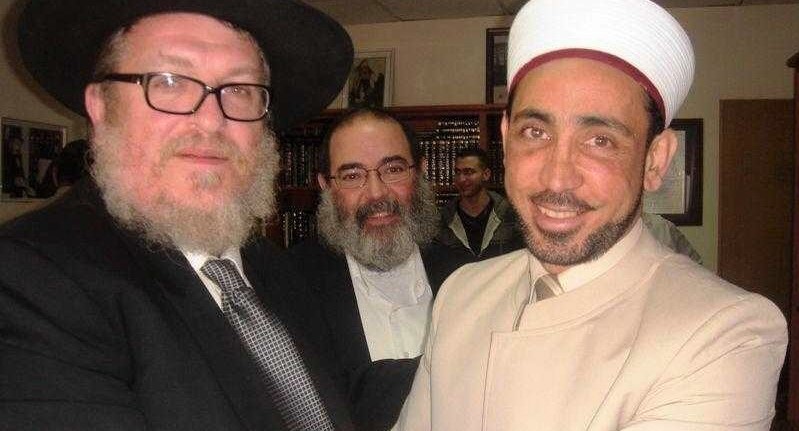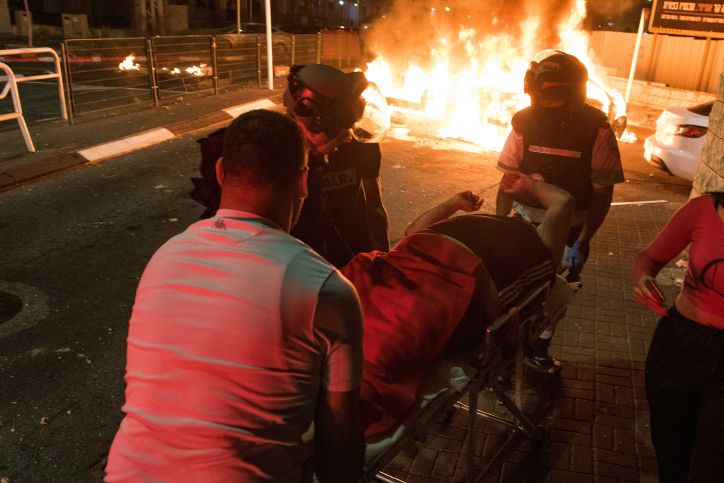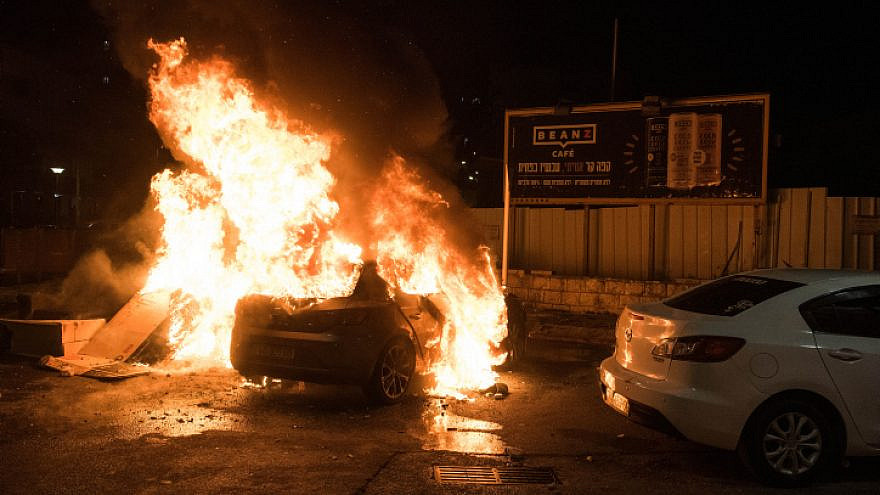The rioting and violence that took place in mixed Jewish-Arab cities during the 11-day Gaza conflict in May has unsettled many Israelis and exposed long-simmering problems in these communities, such as high rates of crime among Arab youth and the decline of Jewish residents in some areas of Israel.
Rabbi Natan Oirechman, the Chabad-Lubavitch emissary of Akko and northern Israel for the past 42 years, told JNS that the situation is challenging and that the latest outbreak of violence is just another obstacle to get over.
Chabad of Akko sits in the city center where a widely reported attack on a Jew took place; a man was pulled out of his car by Arabs and beaten, and his vehicle destroyed.
Over the past decades, Arabs from surrounding villages have moved in and changed the culture and demography to outnumber Jews in some apartment buildings. Because of resulting tensions, many Jews left the city center and now live on the periphery in Jewish neighborhoods. And now, Arabs are following the Jews to these areas as well and slowly moving in there.
Chabad reopened after the Arab rioting, and Israeli Border Police were placed outside during the evenings to keep calm and protect Jews in the neighborhood. The Jewish center gave the forces food and drink, and on Friday night recited Kiddush over wine in the street with them, with locals coming together to listen.
“We have many difficulties in keeping this main Chabad House open, and if we are forced to close down, there will be little left to maintain a Jewish life in the city center,” said Oirechman.

Clashes between Jewish and Arab Israelis in the country’s mixed-population towns were worse than the public believed, even bordering on anarchy, said Border Police Commissioner Maj. Gen. Amir Cohen last week.
The Israel Police and Border Police, he said, faced major obstacles in their ability to cover violent events over such a wide area. “It was impossible given the existing manpower.”
Israeli Prime Minister Benjamin Netanyahu also suggested blocking TikTok during the Arab-induced rioting.
He raised the idea in two meetings as the violence raged in Akko and Lod, a source told Haaretz in a report published on Sunday. Attorney-General Avichai Mandelblit and other security officials opposed the idea.
According to the report, in response, the prime minister’s office released a statement saying that he tried to find ways to deal with the TikTok videos security forces said were inciting violence.
Arabs in eastern Jerusalem and elsewhere were uploading attacks against Jews on TikTok and other social media, inciting more attacks.

‘Jewish residents feel betrayed by their neighbors’
Muli Cohen, a resident of Akko and a businessman involved in real estate, said “the Jewish residents of Akko, Haifa, Lod and Jaffa feel betrayed by the Arab residents for the violence they instigated before and during the conflict with Gaza.”
Arabs and Jews have lived together in the Old City of Akko since before the establishment of modern-day Israel in 1948. Still, there is a history of Arab incidents of violence long before the latest round broke out.
And yet, said Cohen, Arabs residents have seen that “after each time there is a breakout of violence against Jews, there are economic consequences, and their businesses in the Old City market suffer.” In fact, Israeli media is reporting that since the outbreak of riots last month, Jewish customers have largely stopped shopping in Arab shops and restaurants.
Many of the Jewish businesses in the Old City were looted, burned and destroyed during the latest round of violence. “This means that local Arabs pointed out where the Jewish businesses were so they could be targeted,” noted Cohen.
From what he has learned, Cohen alleged that “the police decided not to enter the Old City during the rioting unless there was a life-threatening situation, but not for property or theft law-breaking.”
“The police stood by as the rioting occurred and Jewish shops were destroyed and did nothing,” he continued. “This needs to be investigated who gave the order to stand down.”
Cohen also criticized the affirmative-action-like programs in the country that promote Arabs into important positions in the government in City Hall and local bureaucracy, but says that in return for such generosity, “the Jews were betrayed.”
“Many of the Arab youth have become radicalized,” said Cohen, noting much of the rioting was carried out by the younger generation.
JNS contacted Akko Mayor Shimon Lankri to respond to the Arab rioting that occurred and what the city is doing to defend the residents. He curtly replied, “We said enough!”
‘The writing was on the wall’
Golan Vach, CEO of Lev BaGalil—Hebrew for “Heart of the Galilee”—an NGO that strives to maintain a Jewish majority in the Galilee, said, “The loss of governance in the mixed cities in the north, Lod and in the Negev has been evident for years, and the writing was on the wall.”
One primary reason for the delinquency in the Arab sector, he said, is “the loss of parental and religious authority in the younger generation, which has led to a breakdown of traditional society.”
“The state is failing to deal with Arab violence,” said Vach, noting that in the Galilee, the police take a lax attitude and fail to enforce laws concerning littering, car racing, the use of fireworks and loud mosque noise.
In fact, the Islamic Movement receives funding from abroad and has taken over many of the country’s mosques.
In Akko, Kafr Kana and Saknin, for example, conditions are ripe for an outbreak of violence whenever the Al-Aqsa mosque in Jerusalem is deemed by the Arab media or Islamic Movement to be under threat, said Vach.
The main violent hotspots in mixed cities like Akko, Jaffa, Bat Yam, Lod and Ramle involve actual criminal activity, such as stabbings, shootings, burning and looting businesses. “There needs to be zero tolerance for all crime,” he insisted. “The rule of law needs to be enforced in the north and the south of the country.”
To keep the Galilea and the Negev Jewish and secure, he continued, “it is necessary to encourage as many Jews as possible to move to live in the Galilee and provide for them an adequate standard of living.”
For Oirechman, the Chabad House continues to function and hold holiday events, despite enormous debt and the threat of losing the building due to economic difficulties.
“Chabad relations with the leaders of the Arab community are good, and I have moderated conflicts between Arabs,” he said. “Some of them even ask me for a blessing.”


























